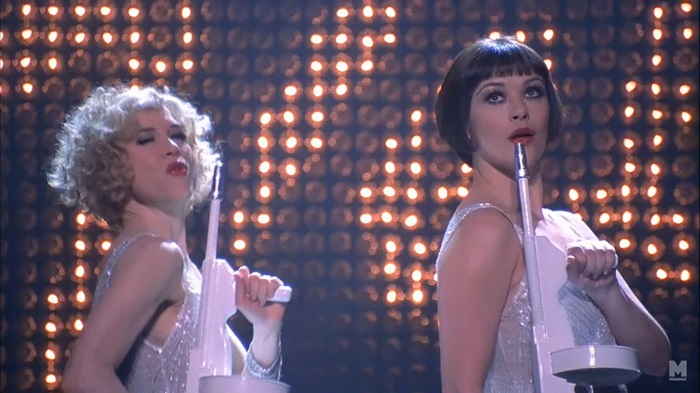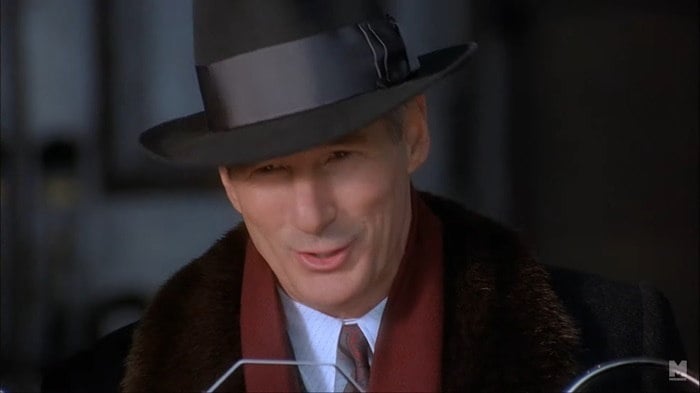Chicago, directed by Rob Marshall and released in 2002, is a musical film adaptation of the Broadway musical of the same name, which was originally based on a play written by Maurine Dallas Watkins. The movie is set in the roaring 1920s in Chicago and follows the story of two murderesses, Roxie Hart and Velma Kelly, as they navigate the corrupt and sensationalized criminal justice system. The film is known for its dazzling musical numbers, sharp choreography, and a narrative that blurs the lines between reality and the characters' fantasies.
Plot Summary
Chicago follows Roxie Hart, an aspiring vaudevillian who murders her lover and ends up in a 1920s Chicago jail. Alongside Velma Kelly, another murderess and performer, they hire charismatic lawyer Billy Flynn. The trio manipulates the media, turning their trials into sensationalized performances, gaining public sympathy and temporary celebrity. As Roxie's trial concludes, she is acquitted, realizing the fleeting nature of fame. The film explores the corrupting influence of the media, the illusion of celebrity, and the consequences of the characters' pursuit of the American Dream in a dazzling and cynical portrayal of the Jazz Age justice system.
The Ending Explained
The ending of Chicago is a culmination of the characters' journeys through deception, celebrity, and the pursuit of the American Dream. The film's conclusion ties up various narrative threads, resolves conflicts, and provides a reflection on the nature of fame and justice in the Jazz Age.
The film's finale is a reflection of the cyclical nature of celebrity culture and the fickle public's appetite for sensational stories. The conclusion also reinforces the film's themes of manipulation, the pursuit of fame at any cost, and the corrupting influence of the media.

One of the key elements of the ending is the courtroom drama that permeates the film. The story revolves around Roxie Hart (played by Renée Zellweger), a wannabe vaudevillian who becomes embroiled in a murder trial after killing her lover in a fit of rage. Velma Kelly (played by Catherine Zeta-Jones) is a fellow inmate and vaudevillian who is also on trial for murder. Both women hire the slick and opportunistic lawyer, Billy Flynn (played by Richard Gere), to defend them and manipulate the media to secure their acquittal.
As the trial progresses, the media circus surrounding Roxie and Velma intensifies. The courtroom becomes a stage for their performances, complete with catchy musical numbers and sensationalized reenactments of the crimes. The public, hungry for scandal and drama, eagerly consumes the spectacle, making Roxie and Velma temporary celebrities.
The film's ending takes a surprising turn when Roxie is acquitted of her charges. The courtroom erupts in celebration, and Roxie is thrust into the spotlight as a newfound star. This outcome reflects the transient and arbitrary nature of fame, suggesting that in the world of Chicago, justice is not blind but rather easily swayed by charisma and manipulation.
The conclusion also delves into the theme of illusion versus reality. Throughout the film, the boundaries between what is real and what is a product of the characters' fantasies are blurred. This is evident in the stylized musical numbers, which often represent the characters' inner thoughts and desires rather than literal events. The ending reinforces this theme as Roxie's newfound celebrity status is portrayed as a glamorous and fantastical affair, complete with adoring fans and a triumphant musical number.
However, as the film reaches its climax, the fantasy begins to unravel. Roxie's moment in the spotlight is short-lived, and she soon realizes that the public's attention is fickle. The film's conclusion underscores the ephemeral nature of celebrity and the emptiness that can accompany the pursuit of fame for its own sake.
In contrast to Roxie's initial rise to stardom, Velma Kelly experiences a reversal of fortune. Once a headlining act in vaudeville, Velma finds herself overshadowed by Roxie's newfound celebrity. This twist in the plot explores the cyclical nature of fame, where one person's rise often coincides with another's fall.
The film's final scenes provide a reflection on the consequences of the characters' actions. Despite being acquitted, Roxie is left to confront the emptiness of her pursuit of fame. The glamorous illusions that surrounded her trial and subsequent celebrity status are stripped away, revealing the hollowness beneath.
In a poignant moment, Roxie returns to her mundane life, realizing that the fantasy she chased was ultimately unfulfilling. This introspective moment adds depth to Roxie's character, showing that beneath the facade of celebrity lies a woman grappling with the consequences of her choices.

The ending of Chicago also addresses the theme of the corrupting influence of the media. Throughout the film, the media is portrayed as a powerful force that can shape public perception and manipulate the justice system. Billy Flynn, the slick lawyer, skillfully uses the media to create a narrative that serves his clients' interests.
The film's conclusion highlights the symbiotic relationship between the media and celebrity. As Roxie becomes a temporary sensation, the media benefits from the sensational story, and in turn, Roxie uses the media to maintain her fleeting celebrity status. This commentary on the interplay between fame and media resonates with the contemporary culture of celebrity worship and the 24-hour news cycle.






